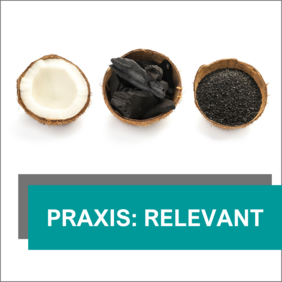Due to different adsorption properties activated carbons based on bituminous coal cannot be replaced by coconut shells based activated carbons in drinkingwater treatment plants in most cases without accepting a significant reduction in adsorption capacity. The changeover to coconut shell based activated carbon is being achieved in waterworks of Wuppertal WSW Energie & Wasser AG (Germany) by modifying the activated carbon management in connection with thermal reactivation. The process is being accompanied by TZW.
When using adsorption processes in waterworks, activated carbons based on bituminous coal are considered the "allrounders" and have significantly higher adsorption capacities than coconut shell based activated carbons, particularly when removing trace substances from surface water and bank filtrats. For this reason, activated carbons based on bituminous coal (BC) have been used in fixed-bed adsorbers at WSW Energie & Wasser AG in Wuppertal (Germany) for decades. When the adsorption capacity is exhausted, the loaded BC are reactivated and reused as reactivates. The activated carbon losses of approx. 15 percent during the reactivation process have been replaced by fresh carbon based on BC so far.
When BCs are used in the waterworks, metal leaching can be observed when starting the operation after refilling the activated carbon. In the reservoir waterworks of WSW Energie & Wasser AG, increased aluminum concentrations of up to 0.3 mg/l were detected in addition to arsenic and antimon. Therefore the newly filled adsorbers can not be operated at full capacity over weeks. Supply bottlenecks for BC-based activated carbons in 2022 also led to the consideration of alternatives for BC-based activated carbons for the Benrath bank filtrate plant.
For these reasons, options for optimising the use of activated carbon were developed for the reservoir waterworks and the bank filtrate plant. In 2019, WSW Energie & Wasser AG together with TZW: DVGW-Technologiezentrum Wasser (German Water Centre), started conducting tests to evaluate the use of different types of activated carbons. A key result of the filter tests was that although conventional activated carbons based on coconut shells (CC) cannot replace BC, highly activated CC based activated carbons or CC reactivates have adsorption properties which are similar to BC reactivates.
Consequently a changeover from activated carbons based on BC to CC based activated carbons can be achieved if the carbon loss required after reactivation is supplemented by fresh carbon based on coconut shells. Operational disadvantages in the mixture of activated carbons based on BC and CC were not observed during the investigations and are also not to be expected due to the comparable properties respectively hardness and bulk density of these activated carbon types. Due to this activated carbon management already practiced in the Dabringhausen and Herbringhausen waterworks of WSW Energie & Wasser AG, the complete conversion from activated carbon based on BC as raw material to activated carbon based on coconut shells will only be achieved after approx. six to seven reactivation cycles. WSW Energie & Wasser Wuppertal was able to prove the effectiveness of the optimisation measure through the intensive preliminary investigations and the monitoring of full scale adsorbers before and after the conversion to the addition of coconut shell activated carbon.
The text is an excerpt from an article that appeared in DVGW energie wasser praxis 10/2023. You can read the full text in German here (pdf file). In the PRAXIS: RELEVANT series, TZW presents examples of successful projects that have been implemented together with water supply companies.

![[Translate to English:] Prüfstelle-Produktprüfung_Teststand Test centre and product testing](/fileadmin/_processed_/0/9/csm_TZW-Karlsruhe_Pruefung_Geraete-Teststand_377188946c.jpg)
























